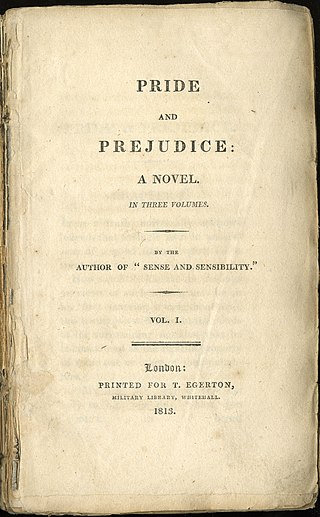
Pride and Prejudice is the second novel by English author Jane Austen, published in 1813. A novel of manners, it follows the character development of Elizabeth Bennet, the protagonist of the book, who learns about the repercussions of hasty judgments and comes to appreciate the difference between superficial goodness and actual goodness.

Pride and Prejudice is a six-episode 1995 British television drama, adapted by Andrew Davies from Jane Austen's 1813 novel of the same name. Jennifer Ehle and Colin Firth starred as Elizabeth Bennet and Fitzwilliam Darcy, respectively. Produced by Sue Birtwistle and directed by Simon Langton, the serial was a BBC production with additional funding from the American A&E Network. BBC1 originally broadcast the 55-minute episodes from 24 September to 29 October 1995. The A&E Network aired the series in double episodes on three consecutive nights beginning 14 January 1996.
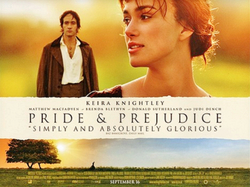
Pride & Prejudice is a 2005 romantic drama film directed by Joe Wright, in his feature directorial debut, and based on Jane Austen's 1813 novel of the same name. The film features five sisters from an English family of landed gentry as they deal with issues of marriage, morality and misconceptions. Keira Knightley stars in the lead role of Elizabeth Bennet, while Matthew Macfadyen plays her romantic interest Mr Darcy.

Pride and Prejudice is a 1940 American film adaptation of Jane Austen's 1813 novel Pride and Prejudice, starring Greer Garson and Laurence Olivier. Directed by Robert Z. Leonard, the screenplay was written by Aldous Huxley and Jane Murfin, adapted specifically from the stage adaptation by Helen Jerome, in addition to Jane Austen's novel. The story is about five sisters from an English family of landed gentry who must deal with issues of marriage, morality and misconceptions. The film was released on July 26, 1940 in the United States by MGM and was critically well received. The New York Times film critic praised the film as "the most deliciously pert comedy of old manners, the most crisp and crackling satire in costume that we in this corner can remember ever having seen on the screen."
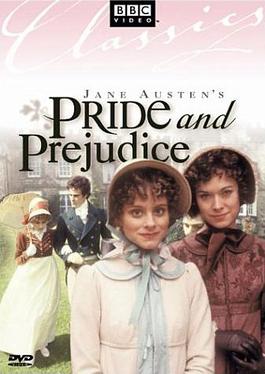
Pride and Prejudice is a 1980 television serial, adapted by British novelist Fay Weldon from Jane Austen's 1813 novel of the same name. It is a co-production of the BBC and the Australian Broadcasting Corporation. The five-episode dramatisation stars Elizabeth Garvie as Elizabeth Bennet and David Rintoul as Mr. Darcy. In the US, it was broadcast by PBS television as part of Masterpiece Theatre.
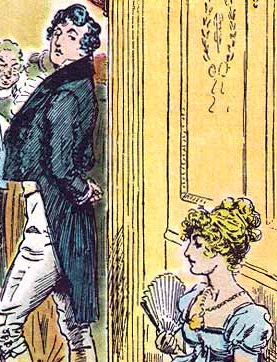
Fitzwilliam Darcy Esquire, generally referred to as Mr. Darcy, is one of the two central characters in Jane Austen's 1813 novel Pride and Prejudice. He is an archetype of the aloof romantic hero, and a romantic interest of Elizabeth Bennet, the novel's protagonist. The story's narration is almost exclusively from Elizabeth's perspective; the reader is given a one-sided view of Darcy for much of the novel, but hints are given throughout that there is much more to his character than meets the eye. The reader gets a healthy dose of dramatic irony as Elizabeth continually censures Mr. Darcy's character despite the aforementioned hints that Mr. Darcy is really a noble character at heart, albeit somewhat prideful. Usually referred to only as "Mr. Darcy" or "Darcy" by characters and the narrator, his first name is mentioned twice in the novel.

An Assembly Such as This is a 2003 novel by Pamela Aidan. It is the first book in a trilogy entitled Fitzwilliam Darcy, Gentleman. The second and third books in the series are titled Duty and Desire, and These Three Remain.
Fitzwilliam Darcy, Gentleman is the collective name given to a trilogy of historical romance novels written by Pamela Aidan. As the title suggests, they are based heavily on Jane Austen's 1813 novel Pride and Prejudice, and feature many events of the novel as seen from the perspective of Mr. Fitzwilliam Darcy, the central male character of Austen's novel.

Duty and Desire is a 2004 historical romance novel by Pamela Aidan. The second in the Fitzwilliam Darcy, Gentleman trilogy, the novel examines Jane Austen's 1813 Pride and Prejudice from the perspective of Fitzwilliam Darcy, the central male character of that novel.
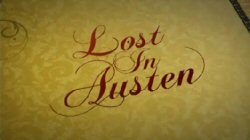
Lost in Austen is a four-part 2008 British television series for the ITV network, written by Guy Andrews as a fantasy adaptation of the 1813 novel Pride and Prejudice by Jane Austen. Amanda, a young woman living in modern London, enters the plot of the novel through a portal in her bathroom, to join the Bennet family and affect events, generally disastrously.

Pride and Prejudice and Zombies is a 2009 parody novel by Seth Grahame-Smith. It is a mashup combining Jane Austen's classic 1813 novel Pride and Prejudice with elements of modern zombie fiction, crediting Austen as co-author. It was first published in April 2009 by Quirk Books and in October 2009 a Deluxe Edition was released, containing full-color images and additional zombie scenes. The novel was adapted into a 2016 film starring Lily James and Sam Riley.

Lady Catherine de Bourgh is a character in the 1813 novel Pride and Prejudice by Jane Austen. According to Janet Todd, Lady Catherine can be seen as a foil to the novel's protagonist Elizabeth Bennet.

Mr William Collins is a fictional character in the 1813 novel Pride and Prejudice by Jane Austen. He is the distant cousin of Mr Bennet, a clergyman and holder of a valuable living at the Hunsford parsonage near Rosings Park, the estate of his patroness Lady Catherine De Bourgh, in Kent. Since Mr and Mrs Bennet have no sons, Mr Collins is also the current heir presumptive to the Bennet family estate of Longbourn in Meryton, Hertfordshire, due to the estate being entailed to heirs male. Mr Collins is first introduced during his visit to Longbourn. His dull-witted character is in parallel to another 'Austen' character, Mr. Rushworth, from Mansfield Park. Mr Collins is also somewhat comparable to the Shakespearean character, Malvolio, from Twelfth Night.

The Lizzie Bennet Diaries is an American web series adapted from Jane Austen's 1813 novel Pride and Prejudice. The story is conveyed in the form of vlogs. It was created by Hank Green and Bernie Su, produced by Jenni Powell and stars Ashley Clements, Mary Kate Wiles, Laura Spencer, Julia Cho and Daniel Vincent Gordh. It premiered on a dedicated YouTube channel on April 9, 2012, and subsequently concluded when the 100th episode was posted on March 28, 2013.

The Bennet family is a fictional family created by the English novelist Jane Austen in her 1813 novel Pride and Prejudice. The family consists of Mr and Mrs Bennet and their five daughters: Jane, Mary, Catherine, Lydia, and Elizabeth, who is the novel's protagonist.

Death Comes to Pemberley is a three-part British television drama based on the best-selling 2011 P. D. James novel of the same name. Her murder mystery was based on the style and characters of Jane Austen's 1813 novel Pride and Prejudice.
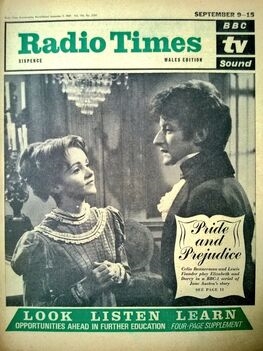
Pride and Prejudice is a 1967 BBC television six-part serial, based on Jane Austen's 1813 novel of the same name.
Pride and Prejudice is a 1958 British television adaptation of the Jane Austen's 1813 novel of the same name, which aired on the BBC. Cast members included Alan Badel, Pamela Binns, Jane Downs, Susan Lyall Grant, Marian Spencer, Vivienne Martin, Hugh Sinclair, William Squire, Joan Carol, Jeanne Elvin, Colin Jeavons, Barbara New, and Greta Watson. Six half-hour episodes were produced, presumably aired live, and telerecorded for overseas broadcast. All six episodes were subsequently junked and are believed to be lost. The designer was Stephen Bundy.
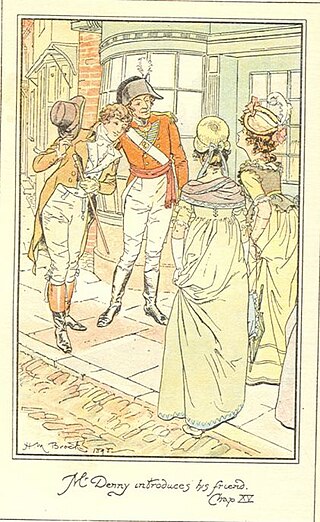
George Wickham is a fictional character created by Jane Austen who appears in her 1813 novel Pride and Prejudice. George Wickham is introduced as a militia officer who has a shared history with Mr. Darcy. Wickham's charming demeanour and his story of being badly treated by Darcy attracts the sympathy of the heroine, Elizabeth Bennet, to the point that she is warned by her aunt not to fall in love and marry him. It is revealed through the course of the story that George Wickham's true nature is that of a manipulative unprincipled layabout, a ne'er-do-well wastrel, compulsive liar and a degenerate, compulsive gambler, a seducer and a libertine, living the lifestyle of a rake. Lacking the finances to pay for his lifestyle, he gambles regularly and cons credit from tradesmen and shopkeepers and skips out on paying-up.

















